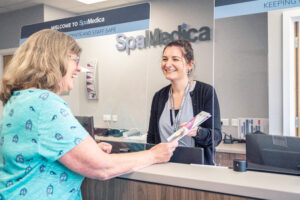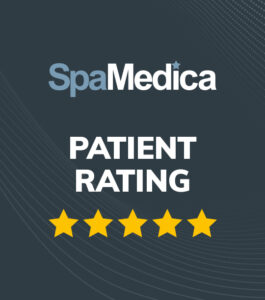Sittingbourne
Denne Court, Hengist Field, Oad Street, Borden, Sittingbourne, Kent, ME9 8LT
Denne Court, Hengist Field, Oad Street, Borden, Sittingbourne, Kent, ME9 8LT
Opening hours:
Mon to Fri 8:00 - 18:00
Tel: 0330 058 4280
SpaMedica Sittingbourne is a modern, state-of-the-art facility, which opened June 2021. Our hospital facilities here are first-class and equipped with the latest technology.
We look forward to welcoming you to SpaMedica Sittingbourne The team here will always welcome you with a smile and answer any questions you have about your appointment or surgery.
Update – Ongoing Roadworks
For patients who are travelling to our hospital via the M2, please note that Junction 5 is currently undergoing maintenance work until Friday 13th January 2023, affecting access to the Stockbury Roundabout.
There are a number of signposted diversions in place for patients joining or leaving the M2 at Junction 5.
For more information visit: https://www.spamedica.co.uk/ongoing-roadworks/
Conditions we treat
Getting treatment
How to find us
Our hospital is located to the South-west of Sittingbourne in Denne Court. Denne Court is accessed from Pond Farm Road. To reach Pond Farm Road you can come via Sutton Baron Road from the East or Oad Street from the West. The turn onto Denne Court is located at the South end of Pond Farm Road, very close to the junction with Sutton Baron Road as shown on the map overleaf. Once you’ve turned into Denne Court – take the first left and you will arrive at SpaMedica. Our parking spaces are located round two sides of the building.
The closest bus stop to the hospital is located on Sutton Baron Road which is approximately a 2-minute walk to the hospital and bus numbers 344 and 345 stop here. For more information,
please visit www.chalkwell.co.uk
The nearest train station is Sittingbourne, which is located on St. Michaels Road. The distance from the station to the hospital by taxi is approximately 10 minutes. For train times/connections please call 03457 484950 or click here to visit the National Rail Journey Planner.
If you live in England, all you need to do is let your optician or GP know which healthcare provider and hospital location you would like to have your cataract treatment at, and they’ll send a referral to your chosen provider. You should hear back from your provider within two to three weeks following your referral. If you haven’t heard anything after this point, we recommend contacting the person who referred you—this will be your optician or GP—to check on the status of your referral.
Giving you local access to the highest standards of care. With over 61 hospitals nationwide, all rated 'Good' or 'Outstanding' by the Care Quality Commission, SpaMedica is the largest independent provider of NHS cataract treatment in the UK. Our experts will ensure you feel comfortable and confident from diagnosis to recovery. Having partnered with the NHS for over 15 years, we proudly support thousands of patients every month with ophthalmic conditions.
The only suitable treatment for cataracts is surgery. It is one of the safest surgeries you can have and is also the most common operation performed in the UK today, taking up to only 20 minutes for routine cases. The cloudy lens is removed and replaced with an artificial lens (implant). This is normally done under a local anaesthetic using eye drops to numb the eye.
Leave a review
Got a story to share? Let us know what you think by leaving us a review.
Frequently asked questions
Cataracts are a clouding of the lens in the eye which can cause blurry vision and difficulty seeing in low light conditions.
Common symptoms of cataracts include blurry or cloudy vision difficulty seeing at night sensitivity to glare and faded colors.
A Yag Laser Capsulotomy is a procedure used to treat a cloudy capsule behind the lens that may develop after cataract surgery. The laser creates a hole in the capsule to improve vision.
Age Related Macular Degeneration is a progressive eye condition that affects the macula causing loss of central vision.
Age Related Macular Degeneration is not preventable but certain lifestyle changes such as eating a healthy diet rich in fruits and vegetables not smoking and protecting your eyes from UV rays can help lower the risk of developing the condition.


